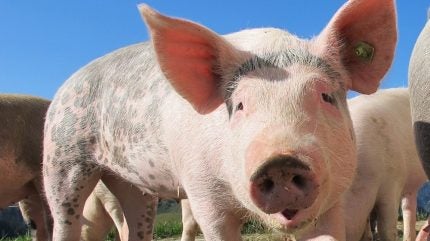
Investors said to represent $13tn in assets are calling on global leaders to ramp up efforts to tackle the use of antibiotics in the meat industry and elsewhere.
Some 80 funders have backed a statement on the issue from Investor Action on Antimicrobial Resistance (IAAMR), timed to coincide with the UN General Assembly’s meeting on antimicrobial resistance this month.

Discover B2B Marketing That Performs
Combine business intelligence and editorial excellence to reach engaged professionals across 36 leading media platforms.
The investment groups, which include the UK’s FAIRR Initiative, are concerned that the use of antibiotics in the meat industry builds up antimicrobial resistance (AMR) in the human population and is “a threat to the health of our people and planet”.
IAAMR suggested the threat is “a systemic risk akin to Covid-19 and the 2008 financial crisis”.
It said AMR killed more people than HIV/AIDS and malaria in 2019 and suggested AMR-related treatments and productivity losses could cost $412bn and $443bn respectively per year by 2035.
Jeremy Coller, founder of FAIRR, said: “An estimated 80% of antibiotics are administered to livestock rather than people in the US alone. Investors recognise that AMR is not only a threat to the health of our people and planet but to the financial well-being of those who rely on investment returns to fund their retirements.”

US Tariffs are shifting - will you react or anticipate?
Don’t let policy changes catch you off guard. Stay proactive with real-time data and expert analysis.
By GlobalDataHe added: “Companies – from pharma to pork producers – take advantage of lax regulations allowing the routine use of antibiotics in animals enabling them to cut corners in animal welfare, while diminishing antibiotic effectiveness in humans.”
The 80 investor signatories, including Legal & General Investment Management (LGIM) and HESTA, are calling on global leaders and policymakers to act on seven critical asks for tackling AMR – encompassing science-based guidance and targets, effective stewardship and a ‘One Health’ approach to consider the interplay between animal, human and environmental health.
FAIRR said that its analysis found that, since 2020, at least 20 shareholder resolutions have targeted AMR risks throughout global supply chains – from pharmaceutical companies and livestock producers, to food retailers and restaurants.
Earlier this year, the then UK government pledged £85m ($111.5m) to support the research and development of new antibiotics, improve global health infrastructure and strengthen surveillance systems to accurately monitor AMR threats.
Just Food asked the UK industry bodies the British Meat Processors Association and the British Pig Association for their response to the IAAMR statement.
Nick Allen, CEO of the BMPA, pointed out that it is an active member of The Responsible use of Medicines in Agriculture (RUMA) Alliance which champions the responsible use of medicines across all the livestock sectors in the UK.
He said: “UK livestock production is subject to some of the highest and rigorous health and welfare standards in the world and antibiotics can only be used when prescribed by a vet. UK livestock sectors have made huge progress in tackling AMR and reducing use over the last decade, taking ownership and defining reduction targets – a journey that has been robustly monitored and reported on and which evidences significant reductions.
“In the UK we have robust regulations for antibiotic use. The latest update to the UK Veterinary Medicines Regulations which came into force earlier this year bans the routine use of antibiotics in farm animals. However, a blanket ban of prophylaxis could be harmful to animal health and welfare, while also increasing the risk of diseases spreading. It is important that vets continue to have the option of prescribing antibiotics when necessary for the sake of animal health and welfare, based on sound scientific risk assessment and clinical judgement. Prophylactic use is therefore restricted to ‘exceptional circumstances’.





